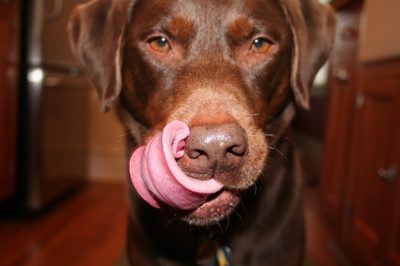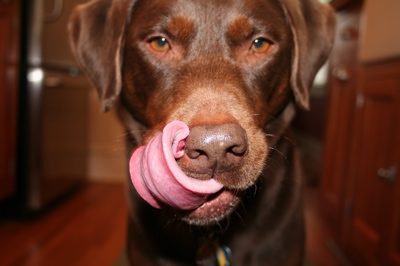

Why Do Dogs Lick Their Lips?
The interpretation by Turid Rugaas that lip licking is a calming signal has gained widespread standing in Dogdom and I agree that the licking of lips has a calming effect, (most especially for the one doing the licking), but not because it is an intentional signal. Rather, it speaks to something much deeper, a networked intelligence that works by way of physical memory, i.e. the stuff of feelings.
One clue that something larger is going on is that dogs often display these "signals," particularly yawning, when no one is looking and in fact they can be looking off to the distance with their back turned to the supposed target of their signal. Another interesting clue is that it occurs in disparate species with a completely different "Umwelt," such as horses. Monty Roberts writes that he once observed a dominant mare drive a rambunctious young stallion out of the herd and she only let him rejoin once he began to lick his lips. So in training he first drives a horse away from him, and then when it licks its lips, he lets it come toward him until at some point, usually within minutes, the horse willingly puts its head into a halter.
But if in my model the horse isn’t signaling compliance to his "leader," or a dog isn’t signaling a mark of appeasement or a peaceful state of mind to another, what then is going on in the mind of an animal licking its lips, as well as what’s going on in the mind of the other animal that might happen to see this?
Emotional conductivity.
There are two emotional values, or "poles," and just like terminals in a battery, only when these are connected can the emotional juices flow. The flow of emotion as energy is what calms, not the mental transmission or reception of a so-called signal.
Just as a conversation can’t happen if both people talk at once, emotion can’t flow if both individuals are occupying the same polarity. The predator pole (-) is the one who projects energy, this is Roberts driving the horse away. The preyful polarity (+) is the one that absorbs energy as in the one licking its lips (or any other act of ingestion). When these polarities are clearly defined between two individuals (and they can flip from moment to moment), then the emotional circuit is connected and emotion can move between them. Both individuals feel good because they feel connected to each other and their movements and manner induce a feeling of motion and grounding within each other.
The principle of emotional conductivity, no matter at whatever high level of elaboration it may manifest as (such as "sinking our teeth" into a good book), is implemented by the oral urge and the biomechanics of ingestion and thereafter in emotional experience via the physical memory of same. This brain-to-gut connection is most vivid in the infancy of every animal in the urge to suckle, but it does not atrophy out of consciousness as the individual matures. Rather the brain-to-gut connection is how external objects of attraction are vicariously imported into the body/mind for emotional "digestion." And whenever something feels good, it is associated with the physical memory of being calmed, or grounded, by the act of ingestion. The oral urge and brain-to-gut connection serves as a template for the rest of an animal’s life, the human animal included. The brain-to-gut connection is why we feel moved, or touched by something that feels right.
So the newborn puppy’s jangled nerves at experiencing a sharp, hard, cold, bright world of intense stimulation at birth, is calmed the instant its mother’s warm milk makes its way into its gut. This calming factor never goes away, this imprint serves as a standard for assaying everything it will encounter for the rest of its life. When it is stressed and yet strongly attracted to something, it will lick its lips from the physical memory of warm sustenance calming its body and mind.
An example of ingestion as the basis of emotional grounding we can find in human experience when we consider the first ten minutes of a cocktail party. I don’t know about you but I’m not having fun. The atmosphere is tense, nervous laughing at jokes that aren’t particularly funny, the breaking of ice is almost painful. But then with that first sip of a drink or taste of pate, the tension begins to melt and is soon replaced with the feeling of being grounded. Things are okay, I’m going to get out of here alive. I might even have fun. Which is really an odd thing because with our highly developed intellects, why can’t we simply come together for scintillating conversation, why must every gathering or holiday revolve around food and drink?
Try this experiment. Wait for a moment when your dog is across the room or the yard and then show him a biscuit. What does he do? Invariably he licks his lips. Is he trying to calm you, appease you so you will give him what he desires, or is it more likely that he is already tasting the biscuit by way of a physical memory that has been imprinted into his body/mind from earlier experiences? Why doesn’t he just run to the biscuit first without expending useless energy on licking at a distance? This is what Pavlov discovered. Dogs salivate to the conditioned sound of the bell, not because they are anticipating the taste of meat, or have been conditioned to associate the bell with the meat as if that is saying something, but rather because by virtue of conditioning they are already tasting the meat by way of the brain-to-gut connection as the substrate of the animal mind.
The physical memory of ingestion is also what’s going on with Monty Robert’s obstreperous stallion. The mare drives him out because the hectic energy he’s projecting onto the herd is disrupting the emotional conductivity of the group. Simultaneously, the intensity of the pressure she brings to bear on him kindles within his body/mind the earliest of physical memories. By licking his lips the stallion indicates that emotionally he is shifting from the predatory to the preyful (soft) polarity. But he’s not intentionally signally some kind of concept, "okay I’ll behave." Instead, because the state of attraction between them is so strong and predicated on a deep, visceral imprint, he is reliving the feeling of being grounded into the first horse he has ever known, his mother, and he is reliving the taste of her milk. And as that feeling of grounding comes over him, the mare is able to feel connected to him again given his softened body manner. Her body softens in kind because his supple demeanor is but a higher elaboration for her of the same fundamental brain-to-gut connection. They have now reconstituted their emotional connection by way of the physical memory triggered within them, the reliving of a direct transfer of a very real physical energy, i.e. the nutrients ingested in their past. And the stallion has now learned to keep his energy within the confines of what the herd can conduct in order to retain the feeling of being grounded. He’ll get his chance to project, but it will be now occur in sync with the herd rather than being unfocused and Helter Skelter. None of this is signaling, it’s a collective calibration arising from the reliving of earliest imprints, which is why social animals have to be socialized by way of imprinting.
So for example, we have emotional experiences when we hear words uttered to us, but it’s not the words that are the energy, rather the words convey a virtual energy by triggering physical memories of emotional states from our past. The internal dynamic produces the energy (hormones, synapses, neuro-chemicals, blood pressure, heart beats, glandular secretions, etc., etc.) that consumes us emotionally. And while there is indeed an actual transfer of energy by way of the words due to this internal affects, in reality no material energy arced across the gap. The energetic effects happen within our body/minds as we are induced to become either more or less conductive due to physical memories.
Now when it comes to human/dog relations we don’t need to lick our lips so that our dog feels connected to us. When it comes to feelings the higher elaborations of a soft touch and a warm word will do just fine. The brain-to-gut connection is a many splendored thing.
Join the newsletter and never miss out on dog content again!
"*" indicates required fields
By clicking the arrow, you agree to our web Terms of Use and Privacy & Cookie Policy. Easy unsubscribe links are provided in every email.